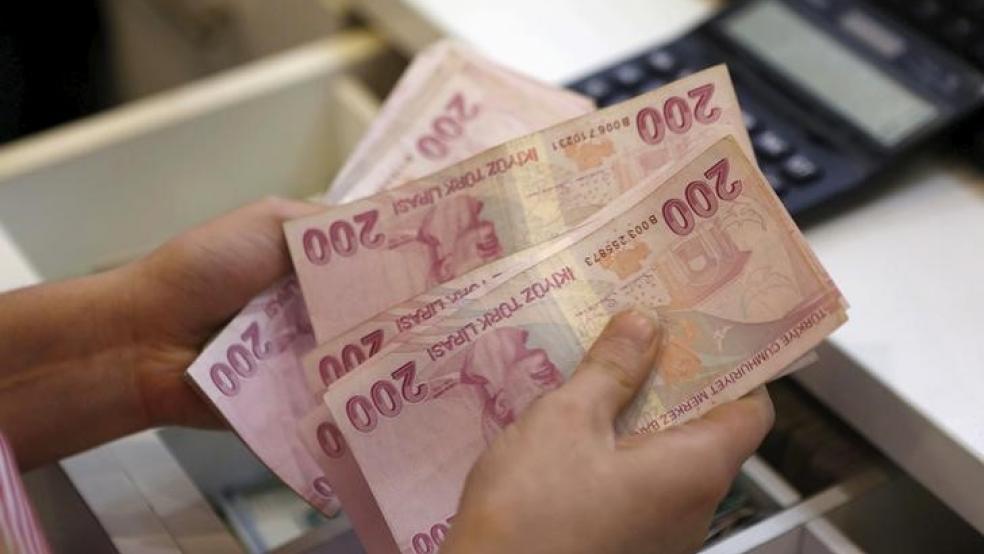ANKARA (Reuters) - Divisions among Turkey's economic policy makers, which have hindered the central bank and unnerved investors, are unlikely to abate before an April referendum on granting the stronger powers that President Tayyip Erdogan has long sought.
The lira has been one of the world's worst-performing currencies this year, falling more than seven percent against the dollar, on top of double-digit losses in both of the last two years. Inflation is rapidly heading toward double figures.
Yet Erdogan's aides and some government officials, eager to maintain the Turkish leader's reputation for delivering strong growth, insist the country can ill-afford rate increases with the economy slowing at its sharpest pace in almost a decade.
Other senior officials disagree and believe politicians should be less vocal about monetary policy, even if this means higher rates to steady the crumbling lira decisively and restrain inflation. But in Ankara's corridors of power, theirs are the voices less heard.
"Truth be told, the dominant view in Ankara is clear: Erdogan needs to be convinced for interest rates to be hiked," said one senior economy official, speaking on condition of anonymity because the issue is so politically sensitive.
"The central bank's position is truly very difficult because it cannot satisfy anyone with its decisions. It is under constant criticism."
The bank has managed, for now, to put a brake on the lira's decline. At its last meeting on Jan. 24, it significantly hiked funding costs while leaving its main interest rate at 8 percent, instead lifting overnight and last resort borrowing rates.
The lira
has since pulled back from its record low of 3.9417 to the dollar on Jan. 11, and was at 3.7505 in mid-session trading on Friday.But the convoluted methods of the central bank (CBRT) have done little to reassure investors worried about its independence, or to contain inflation, which rose to 9.22 percent year-on-year in January, according to data released on Friday."Big rise in inflation in January. CBRT has to take responsibility. Policy has been too loose for too long, and lira weakness taking toll," Timothy Ash of BlueBay Asset Management, a veteran Turkey watcher, said on Twitter.GRAPHIC-Lira value, interest rates http://tmsnrt.rs/2jUiH7wErdogan has said the bank has a free hand and has all the tools it needs to stem the lira's falls. Senior officials around him have repeatedly said it is independent, and that politicians are merely stating their opinions.But his insistence that interest rates cause inflation and that those urging rate hikes are part of a conspiracy against Turkey have set him at odds with members of his own team."The economic leadership is split in half between the presidential palace and the government," said one government official. "The reality is that the central bank is worn out ... Its credibility, with the help of politicians, must be raised."INFLECTION POINT?Erdogan's supporters see the move to replace Turkey's parliamentary democracy with an all-powerful presidency as a guarantee of stability at a time when the country faces significant security threats and the economic slowdown."The economic leadership has a harmony problem, this is undeniable ... But the problems with coordination can be resolved with constitutional change and the presidential system," said a senior member of the ruling AK Party.Opponents fear a lurch toward authoritarianism, saying checks on Erdogan's substantial powers will be removed.But some investors are hopeful that once the political noise dies down, there will be more clarity on the leadership structure and pragmatism will prevail."The base case is (Erdogan) gets what he wants," said one London-based fund manager. However, he pointed to the long-standing presence in the cabinet of Deputy Prime Minister Mehmet Simsek as a reassuring sign."We saw in the past after the last election ... that people had been worried about who would be put in charge of the economy and they still got Simsek," he said.Simsek, a former finance minister seen as more pro-reform than some in the economic team, was appointed to run the economy last November after the election which had raised concern about Erdogan's growing influence."In general, once you get past an event like (the referendum), if there is less uncertainty about the policy direction that can be a benefit," said Hardeep Dogra, portfolio manager at BNP Paribas Investment Partners in London."If we get to that stage and somehow economic policy or policy more broadly is made on a longer-term constructive basis, you can see the potential inflection point for the credit metrics of the country."All will depend on Erdogan himself. His comments after the latest central bank decision last week that interest rates and "not tomatoes, not pepper" cause inflation may give little grounds for investor optimism."People invested in Turkey when interest rates were 8-9-10 percent as well ... High volatility is the real problem. You don't know what will happen tomorrow. What causes this is the approach of politicians," former central bank governor Durmus Yilmaz told a recent conference in Istanbul."The coordination is currently broken. The orchestra isn’t playing the same tune today," he said. (Additional reporting by Sujata Rao in London; Writing by Nick Tattersall; editing by David Stamp)



